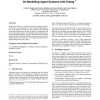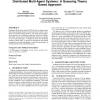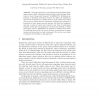AOSE
2004
Springer
13 years 10 months ago
2004
Springer
While there are many useful models of agents and multi-agent systems, they are typically defined in an informal way and applied in an ad-hoc fashion. Consequently, multi-agent sys...
ERLANG
2004
ACM
13 years 10 months ago
2004
ACM
Multi-agent systems are a kind of concurrent distributed systems. In this work, some guidelines on how to create multi-agent systems using Erlang are presented. The modelled syste...
ATAL
2005
Springer
13 years 10 months ago
2005
Springer
We introduce MAGENTA’s commercial multi-agent systems technology, and illustrate its practical use by describing a field-tested application in the area of logistics/scheduling....
ATAL
2005
Springer
13 years 10 months ago
2005
Springer
Distributed Multi-Agent Systems (DMAS) such as supply chains functioning in highly dynamic environments need to achieve maximum overall utility during operation. The utility from ...
WRAC
2005
Springer
13 years 10 months ago
2005
Springer
Abstract. This paper introduces a novel framework for designing multiagent systems, called “Distributed Agent Evolution with Dynamic Adaptation to Local Unexpected Scenarios” (...
PROMAS
2005
Springer
13 years 10 months ago
2005
Springer
In a multi-agent system, the organization determines the architecture of the whole system, and the way and policies for agent collaboration and interactions. Although this is a key...
GECCO
2005
Springer
13 years 10 months ago
2005
Springer
In this paper we investigate the emergence of communication in competitive multi-agent systems. A competitive environment is created with two teams of agents competing in an explo...
EUC
2005
Springer
13 years 10 months ago
2005
Springer
Smart spaces are open complex computing systems, consisting of a large variety of cooperative smart things. Central to building smart spaces is the support for sophisticated coordi...
CEEMAS
2005
Springer
13 years 10 months ago
2005
Springer
Adversariality of the agents with respect to the multi-agent system can be a serious issue in the design of open multi-agent systems. Until now, many incoherent definitions of suc...
ATAL
2005
Springer
13 years 10 months ago
2005
Springer
We present TECTLK, a logic to specify knowledge and real time in multi-agent systems. We show that the model checking problem is decidable, and we present an algorithm for TECTLK ...



